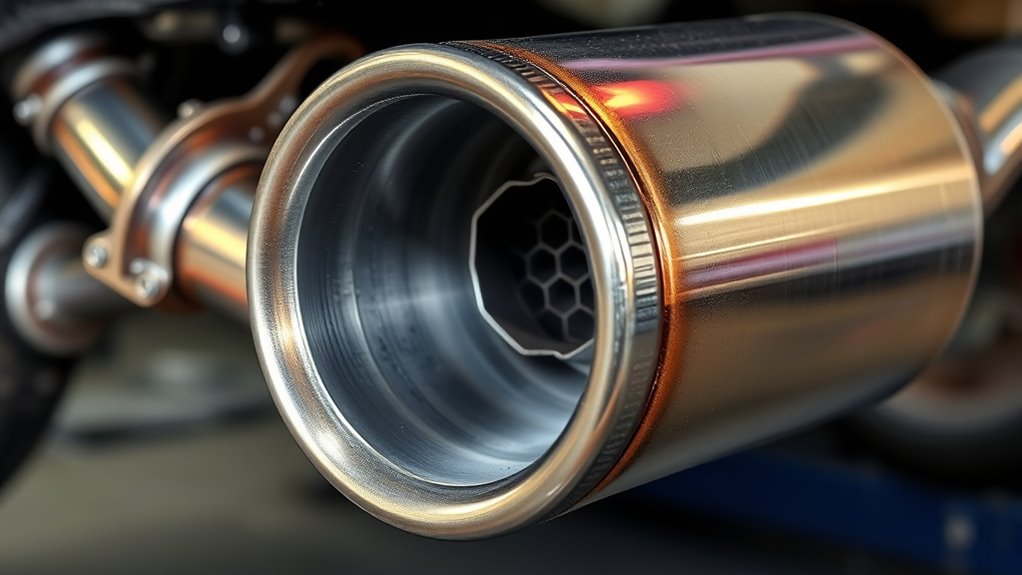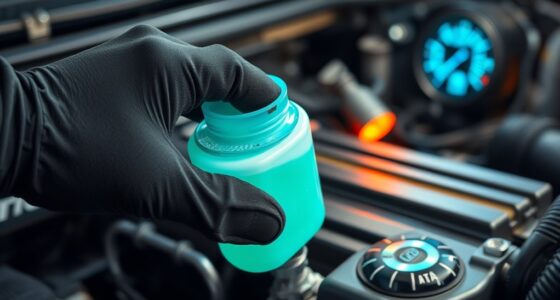To care for your exhaust system and catalytic converter, regularly inspect for leaks, damage, or corrosion, and replace worn parts promptly. Keep your vehicle maintained with quality fuel, routine oil changes, and timely air filter replacements to reduce buildup. Wash the undercarriage and apply rust-proof coatings, especially in winter, to prevent rust. Avoid aggressive driving habits and short trips that harm system components. If you want to protect your vehicle’s performance further, there’s more to learn below.
Key Takeaways
- Regularly inspect the exhaust system for leaks, corrosion, or damage to ensure optimal performance and emissions compliance.
- Use quality fuel, perform routine engine tuning, and replace filters to reduce carbon buildup and protect the catalytic converter.
- Wash the vehicle and apply rust-proof coatings to prevent corrosion, especially in harsh winter conditions.
- Avoid aggressive driving and short trips; warm up the engine properly to prevent system stress and damage.
- Address any signs of rattling, unusual smells, or decreased performance promptly to prevent costly repairs.

Your vehicle’s exhaust system and catalytic converter play an essential role in reducing emissions and guaranteeing smooth performance. Without proper care, these components can develop issues that lead to increased pollution, reduced fuel efficiency, and costly repairs. Regularly inspecting and maintaining your exhaust system helps you catch problems early, preventing minor issues from escalating into major repairs.
Start by paying attention to any unusual smells, noises, or decreases in performance. A strong smell of rotten eggs, for example, often indicates a problem with the catalytic converter. Rattling sounds under your vehicle may suggest loose or damaged parts, and a sudden dip in fuel economy can be a sign your exhaust system isn’t functioning at its best. When you notice these signs, it’s best to have a professional inspect your system promptly. Early diagnosis allows you to address issues before they cause further damage or emissions problems.
Keep your exhaust system clean by ensuring your engine is properly tuned and using quality fuel. A poorly maintained engine can produce excessive carbon buildup, which can clog your converter and exhaust pipes. Regular oil changes and air filter replacements help maintain ideal combustion, reducing the burden on your exhaust system. Additionally, using the right fuel and avoiding contaminants like leaded gasoline or fuels with high sulfur content can help extend the life of your catalytic converter. Moreover, understanding the importance of a high contrast ratio in your vehicle’s exhaust emissions helps in assessing the efficiency of your catalytic converter.
Protecting your exhaust components from rust and corrosion is essential, especially if you live in an area with harsh winters or salted roads. Regularly washing your vehicle, including the undercarriage, helps remove salt and grime that can accelerate corrosion. Applying a rust-proof coating or undercoat can provide an extra layer of protection. When replacing parts, choose high-quality components that resist corrosion and are compatible with your vehicle to guarantee longevity.
Driving habits also influence your exhaust system’s health. Avoid aggressive driving, such as rapid acceleration and hard braking, which can strain exhaust components and cause premature wear. Warm up your engine before driving off, especially in cold weather, to allow the catalytic converter and other parts to reach ideal operating temperatures. This helps guarantee complete combustion and reduces the likelihood of carbon buildup and other deposits.
Finally, prioritize regular inspections and timely repairs. Have your exhaust system checked during routine maintenance, and address any leaks, cracks, or damaged parts immediately. Doing so not only keeps your vehicle running smoothly but also guarantees it complies with emissions standards. Proper care of your exhaust system and catalytic converter ultimately preserves your vehicle’s performance, saves you money on repairs, and helps protect the environment.
Frequently Asked Questions
How Often Should I Replace My Catalytic Converter?
You should consider replacing your catalytic converter every 100,000 to 150,000 miles, but it depends on your driving habits and vehicle condition.
If you notice reduced engine performance, increased emissions, or a Check Engine light, it’s time to have it inspected.
Regular maintenance can extend its life, but if it becomes clogged or damaged, replacement is necessary to keep your vehicle running efficiently and meet emissions standards.
Can I Drive With a Damaged Exhaust System?
Driving with a damaged exhaust system isn’t a good idea; it’s like trying to sail a ship with a hole in the hull. You might be able to continue, but it risks increased emissions, poor engine performance, and potential safety hazards.
Plus, it could lead to costly repairs down the line. If you notice unusual noise, fumes, or decreased efficiency, get it checked out ASAP to keep your vehicle safe and compliant.
What Are Signs of a Failing Catalytic Converter?
You’ll notice a failing catalytic converter if your car stalls or runs poorly, especially during acceleration. Watch for a sulfur or rotten egg smell, reduced fuel efficiency, or unusual exhaust noises.
If your vehicle’s check engine light comes on, it might also indicate converter issues. These signs suggest the converter isn’t properly processing emissions, so you should get it inspected and repaired promptly to prevent further damage.
Does Fuel Quality Affect Catalytic Converter Lifespan?
Yes, fuel quality impacts your catalytic converter‘s lifespan. Poor-quality or contaminated fuel can cause carbon buildup and clog the converter, leading to reduced efficiency and potential damage.
Low-quality fuel may also produce more emissions, stressing the converter further. To extend its life, use high-quality fuel, keep your engine well-maintained, and address any fuel-related issues promptly.
This helps guarantee your catalytic converter functions properly for a longer period.
Are There Eco-Friendly Alternatives to Traditional Catalytic Converters?
Yes, eco-friendly alternatives to traditional catalytic converters exist. You might consider hybrid systems or advanced emission control technologies that reduce harmful pollutants more efficiently.
Some newer vehicles are equipped with next-generation converters using sustainable materials or innovative designs, which lower environmental impact. These options help you meet emissions standards while supporting sustainability.
It’s worth exploring these alternatives with your mechanic or vehicle manufacturer to find the best eco-friendly solution for your car.
Conclusion
Taking care of your exhaust system and catalytic converter is like tending to a delicate garden—you need to give it attention to keep it thriving. Regular inspections, timely repairs, and mindful driving habits help prevent costly issues and ensure your vehicle runs smoothly. Don’t ignore small problems, as they can quickly turn into bigger headaches. By staying proactive, you’ll keep your exhaust system in top shape, just like a well-maintained garden blooms beautifully all year round.









